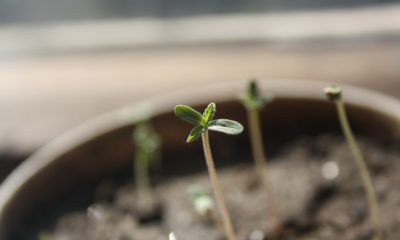
Cultivation
A New York Company Wants to Use Molecular DNA Tags to Track Legal Cannabis
Applied DNA Sciences wants to differentiate between state-compliant and illicit market cannabis by spraying DNA tracking tags on the plants, but some advocates are concerned about regulatory overreach and safety.
Despite some marijuana being “legal” for medical and adult use in many parts of the United States, the vast majority of the cannabis still being produced and consumed is “illegal.” One company, Applied DNA Sciences, is now seeking to stake a claim in the cannabis industry by providing supply chain tracking through spraying a molecular DNA tag onto the buds themselves.
Applied DNA Sciences says that they’re seeking to provide law enforcement and regulators with a way of determining exactly which buds were grown legally and which weren’t — and they are already working with state governments to require the use of their tracking system.
From Cotton to Cannabis
The New York-based firm got its start by working in various other fields to apply unique molecular identification tags to agricultural products (or DNA-enabled ink that can be sprayed on packaging). It’s board and advisory board are made up of professionals and former executives from some of the world’s largest corporations, such as GlaxoSmithKline and PepsiCo, as well as influential ties to government agencies and players.
The most comparable product to cannabis they have had success with is cotton. Because of this success, Applied DNA Sciences has been looking at getting into the cannabis space for the last couple years, but have made a more concerted effort just in the last nine months.
“Cannabis just seemed like something that should be revised and the reason we kinda got excited about it was we already have proven to the world and industry that we know how to tag cotton,” says Gordon Hope Jr., the company’s director of security solutions.
“The growth rates in the industry were obviously attractive,” Hope adds.
Hope spent much of his career prior to working with Applied DNA Sciences at the security firm Honeywell, a multinational corporation that has ongoing regular contracts with the U.S. Department of Defense.
Hope says that in the company’s work with the cotton industry, they were able to uncover bad actors passing their products off as something they were not and have worked with retailers like Costco and Bed, Bath & Beyond to ensure the quality and veracity of what is on the shelves.
How Molecular Tracking Spray Works
After harvest, a grower would apply Applied DNA Science’s patented technology, a “CertainT SigNature” molecular tag by spraying it on the buds themselves. A unique DNA tag, which the company builds with a few lines of scrambled DNA code derived from plants, would then stay on the plant. The company says it will stick to the plant “through UV radiation, heat, cold, vibration, abrasion and other extreme environmental conditions.”
In order to read the DNA tag, the company’s own testing equipment (called SigNify) must be used. The equipment can not only locate the tag as proof the cannabis was legally produced, but also to identify the producer themselves.
“When a sample is placed in the SigNify, the device uses a polymerase chain reaction [which amplifies a certain code by reproducing it thousands of times] to reproduce the tags for easy identification,” Matt Allyn writes for Popular Mechanics. “Because the contents of the tags are secure — Applied DNA employees can access only portions of them — they can’t be copied. Which means counterfeits can’t be made, and fewer illegal products can make it into a legal system.”
DNA in and of itself is not inherently dangerous to consume — humans do it every day. Whenever a human consumes a plant or an animal, they are consuming the DNA found in every single cell as well. Phylos Bioscience co-founder and CEO Mowgli Holmes confirms that the molecular tags are not unsafe for human digestion.
Co-founder and chief innovation officer at Phylos, Nishan Karassik, adds that although he does see a use for this for growers trying to authenticate and protect their own varieties, he doesn’t like the idea of tracking for law enforcement.
“The industry instead needs to use market forces and equal regulatory rules and the problem of diversion or smuggling solves itself,” Karassik says. “We are moving in this direction too slowly in the states, but much more rapidly worldwide.”
What About Existing Seed-to-Sale Systems?
Hope says he does not think molecular tagging will replace seed-to-sale tracking that is already required in legal states, but rather, he thinks it will complement it. Applied DNA Sciences already is working with a seed-to-sale software partner, Theracann International, to expand their complementary services into the cannabis industry around the globe.
“I don’t care which company sells whatever it is, once that tag [the RFID tag currently used in many state seed-to-sale tracking programs] comes off the cannabis, the rest of it is a wing and a prayer,” says Hope. “There is no way to prove provenance or that the black market products didn’t get substituted… That is where the value comes in — we molecularly tag the actual products. They can be repackaged over and over, but that is the value.”
He says they have met with cultivators and were not surprised to find out that their main concern was adding in yet another expense to an already heavily regulated (and costly) system. But, he says there are two reasons these cultivators would want to do it anyway: brand protection and proof of compliance.
“This is a vehicle that allows any regulatory system — whether it be a country or a state — to at least prove that everything they claim they are doing, they are doing. We think it is very very important,” Hope said. “Cultivators may look at it as an added cost, some may look at it as brand protection.”
Hope says they will be presenting directly to the cannabis industry for the first time this week at the National Cannabis Industry Association conference in San Jose, California.
Lobbying for Exclusivity
Earlier this year, advocates and cannabis consumer groups successfully lobbied against the passage of Colorado’s SB 279, which would have required molecular tagging in the legal industry statewide. The controversial bill proposed by Sen. Kent Lambert was killed unanimously by the Senate Finance Committee after two attempts to get it through in 2018.
“[Sen. Lambert] was very supportive of a system like this, I talked to him and said we would move forward with ours,” Hope says.
Hope says he had one-on-one conversations with Sen. Lambert at the time he was proposing the bills and that the main problem preventing the passage was pushback from people in Colorado who were uneducated about the technology and its safety and “didn’t understand what the legislation was attempting to do.”
Larisa Bolivar, the executive director of the Cannabis Consumers Coalition — a Colorado-based non-profit working to represent patients and adult use consumers, says she personally wouldn’t consume cannabis that had any additives sprayed on it.
“The thought of it alone — whether it’s safe or not — just the thought of an additive when we are trying to reduce additives is a turn off to me,” Bolivar says. “It is unnecessary. I personally will not consume cannabis that has additives on it.”
Bolivar testified against Lambert’s bill and says her position on such bills will not change. She also points to the support from legislators and some legal companies as “profit protectionism.”
“It’s protectionist. The whole regulatory scheme around cannabis has been [profit] protectionist,” she says. “I can definitely tell a lot of the pressure [in Colorado] was from law enforcement, and again this points to the irrelevance of it. What needs to happen is cannabis needs to be legalized in other states and federally. That’s how you resolve the issue of black market cannabis competing with regulated cannabis, not adding chemicals to track a plant that is smoked and eaten.”
Hope says that while Applied DNA Sciences did not “directly” lobby for Lambert’s bill in Colorado, the company “did all the grassroots work ourselves” in the states where they’ve talked to legislators, and adds that right now the company is considering different lobbyist proposals. Hope was initially somewhat evasive in answering the question of whether or not the company has or plans to lobby for exclusive contracts in states, and potentially the entire country, should federal law change.
“Would we support it? Sure, it would make sense,” Hope said, when asked about the potential of lobbying for state contracts. “That is like asking us, ‘Do we want to do something that would be good for our business?’ Well yeah, of course. Yes, we think it is a good thing to do, but the deeper question is, does it have social benefit for the people who [consume cannabis]? Forget the selfish reasons of us wanting to see it happen. There is an underpinning of a real need here as this industry starts to grow and it is not being addressed.”
Hope added that he admits that Applied DNA Sciences is “going to have to work” to get the state to see the value of molecular DNA tracking for cannabis plants.
“I think it is going to come from a state or country position first and then we will do pilots with those states or countries that want to work with us and move it forward,” he said. “I think the United States would be smart to get something like this, if only for quality control and nothing else.”
TELL US, do you think molecular DNA tracking on cannabis is a good idea?


























